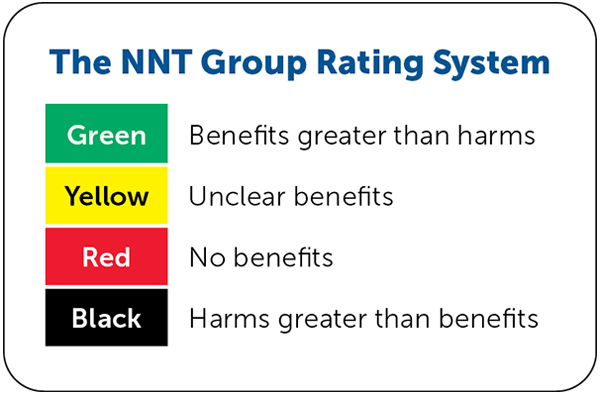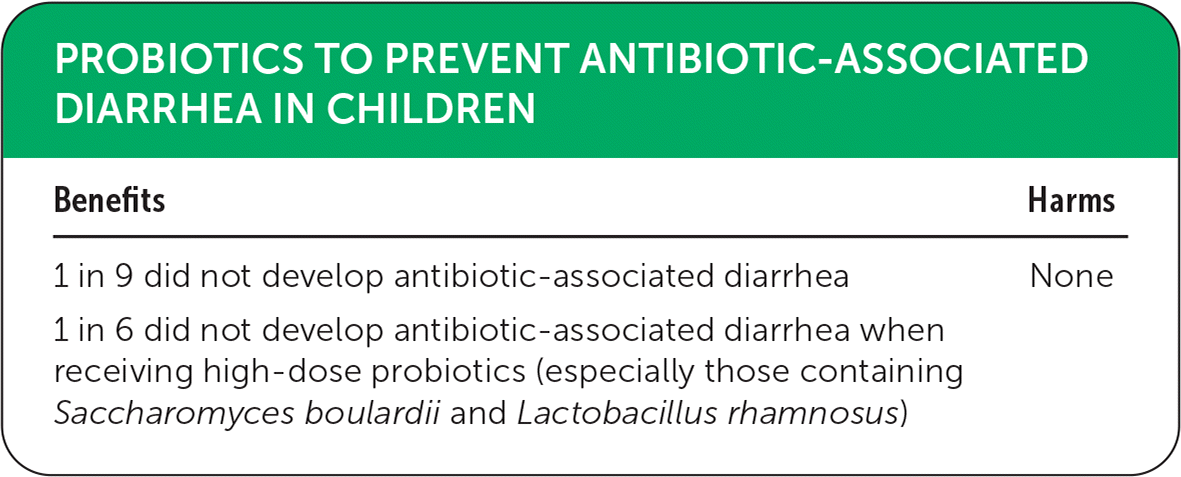
Am Fam Physician. 2020;101(5):online
Author disclosure: No relevant financial affiliations.


| Benefits | Harms |
|---|---|
| 1 in 9 did not develop antibiotic-associated diarrhea | None |
| 1 in 6 did not develop antibiotic-associated diarrhea when receiving high-dose probiotics (especially those containing Saccharomyces boulardii and Lactobacillus rhamnosus) |
Details for This Review
Study Population: Patients 0 to 18 years of age receiving antibiotics in inpatient and outpatient settings
Efficacy End Points: Incidence of antibiotic-associated diarrhea, mean duration of diarrhea
Harm End Points: Serious adverse reactions; common, nonsevere adverse effects (e.g., constipation, rash, abdominal bloating, gas, nausea, flatulence)
Narrative: Antibiotics often disrupt the natural balance of nonpathogenic bacterial flora within the gastrointestinal tract.1 This action can permit pathogenic bacteria to uncontrollably reproduce; interfere with mineral and vitamin metabolism; compromise mucosal integrity within the intestines; and lead to antibiotic-associated diarrhea.2 In children, stool frequency associated with antibiotic-associated diarrhea may be challenging to quantify, and significantly varies between infants and older children.
Antibiotics commonly associated with diarrhea include cephalosporins, lincosamides (especially clindamycin), and aminopenicillins. 3–5 Antibiotic-associated diarrhea is commonly classified as mild to moderate and self-limited, but rare cases of severe antibiotic-associated diarrhea have been reported and require immediate medical attention to treat electrolyte disturbances, volume depletion, toxic megacolon, and pseudomembranous colitis.6,7
Probiotics are supplements that contain nonpathogenic species of bacteria or yeast that reinforce the epithelial, mucosal, intestinal, and systemic immune regulatory activities of the gastrointestinal tract.8,9 Studies have demonstrated that probiotics are safe and effective when used in conjunction with antibiotics for preventing antibiotic-associated diarrhea in otherwise healthy children.10
The Cochrane Inflammatory Bowel Disease Group evaluated the prevention of antibiotic-associated diarrhea with probiotic use in children. The most beneficial strains and doses of probiotics were sought by identifying 33 randomized, parallel, controlled trials including 6,352 participants.11 These trials compared probiotics with placebo, active alternative prophylaxis (i.e., diosmectite or infant formula), or no treatment. The primary end points of the studies included determining the incidence of antibiotic-associated diarrhea and the number and type of adverse events. The secondary end points of the trials identified the most beneficial probiotic strains and doses, mean duration of antibiotic-associated diarrhea, and microbiome characteristics. The heterogeneity of these trials was moderate. Patients who did not complete the studies were excluded from the analysis.
In 27 of the 33 trials, the primary investigators defined antibiotic-associated diarrhea as being mild or moderate in severity, and it was diagnosed after patients experienced three or more loose or liquid stools per day for at least 48 hours. Eight probiotic species were studied, either alone or in combination. Analyses indicated that probiotics coadministered with antibiotics moderately reduced the incidence of antibiotic-associated diarrhea in this patient population compared with active alternative prophylaxis, placebo, and no treatment. Twenty-four studies encompassing 4,415 participants reported no serious adverse reactions. Nonsevere adverse effects (e.g., abdominal bloating, rash, flatulence) were experienced by 4% of patients receiving probiotics, which was statistically insignificant.
High-dose probiotics (5 billion colony-forming units [CFUs] or more per day) were found to be superior in reducing the incidence of antibiotic-associated diarrhea compared with low-dose probiotics (less than 5 billion CFUs per day). Saccharomyces boulardii and Lactobacillus rhamnosus in dosages of 5 to 40 billion CFUs per day were the most beneficial. Findings from eight trials suggested that probiotics may moderately reduce the mean duration of antibiotic-associated diarrhea by nearly one day. Low-quality, inconclusive data regarding microbiome characteristics were inconsistent with selective reporting and were not clinically useful.
The number needed to treat (NNT) with probiotics to prevent one case of antibiotic-associated diarrhea was 9, and the NNT improved to 6 when using high-dose probiotics (95% CI, 5 to 9). Large, multicenter, well-designed, randomized clinical trials are needed to further clarify the benefits of high-dose probiotics and advance knowledge on this topic.
Caveats: Nineteen studies lost patients to follow-up, with percentages ranging from 1% to 46% of patients, although the benefits remained statistically significant via an extreme plausible intention-to-treat analysis. Twenty trials were deduced to have a high-risk of bias, whereas 13 studies had a low-risk of bias. The most prominent biases identified in these trials included: selection bias from allocation concealment and random sequence generation, performance and detection biases from blinding, attrition bias from incomplete outcome data, and reporting bias from selective reporting. However, a test for interaction between bias risk and study outcomes was not statistically significant.
Copyright © 2020 MD Aware, LLC (theNNT.com). Used with permission.
This series is coordinated by Dean A. Seehusen, MD, MPH, AFP assistant medical editor, and Daniel Runde, MD, from the NNT Group.
A collection of Medicine by the Numbers published in AFP is available at https://www.aafp.org/afp/mbtn.
